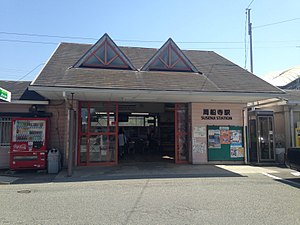Susenji Station
Susenji Station 周船寺駅 | |||||
|---|---|---|---|---|---|
 Susenji Station in 2015 | |||||
| General information | |||||
| Location | Nishi, Fukuoka, Fukuoka Japan | ||||
| Coordinates | 33°34′14″N 130°14′44″E / 33.5705°N 130.2455°E | ||||
| Operated by | |||||
| Line(s) | ■ Chikuhi Line | ||||
| Distance | 8.1 km from Meinohama | ||||
| Platforms | 1 island platform | ||||
| Tracks | 2 | ||||
| Construction | |||||
| Structure type | At grade | ||||
| Accessible | Yes - access to platform by footbridge served by elevators | ||||
| Other information | |||||
| Status | Staffed ticket window (Midori no Madoguchi) (outsourced) | ||||
| Website | Official website | ||||
| History | |||||
| Opened | 15 April 1925 | ||||
| Passengers | |||||
| FY2016 | 4,944 daily | ||||
| Rank | 40th (among JR Kyushu stations) | ||||
| |||||
Susenji Station (周船寺駅, Susenji-eki) is a railway station in Susenji 1-chome, Nishi-ku, Fukuoka City, Fukuoka Prefecture, Japan. It is operated by JR Kyushu and is on the Chikuhi Line.[1][2]
Lines
The station is served by the Chikuhi Line and is located 8.1 km from the starting point of the line at Meinohama.[3] Local and weekday rapid services on the Chikuhi Line stop at this station.[4]
Station layout
The station consists of an island platform serving two tracks. The station building is a wooden structure of western design and houses a waiting area and a staffed ticket window. Access to the opposite side platform is by means of a footbridge.[2][3]
Management of the station has been outsourced to the JR Kyushu Tetsudou Eigyou Co., a wholly owned subsidiary of JR Kyushu specialising in station services. It staffs the ticket counter which is equipped with a Midori no Madoguchi facility.[5][6]
-
A view of the island platform. Note the elevator shaft in the distance.
Platforms
| 1 | ■ Chikuhi Line (through for Kūkō Line) |
for Meinohama, Tenjin, Hakata, Fukuokakūkō (Airport) |
| 2 | ■ Chikuhi Line | for Chikuzen-Maebaru, Chikuzen-Fukae, Karatsu and Nishi-Karatsu |
Adjacent stations
| ← | Service | → | ||
|---|---|---|---|---|
| Chikuhi Line | ||||
| Kyūdai-Gakkentoshi | Local | Hatae | ||
| Kyūdai-Gakkentoshi | Rapid (Weekdays) | Hatae | ||
| Rapid (Weekends): Does not stop at this station | ||||
History
The private Kitakyushu Railway had opened a track between Fukuyoshi and Hamasaki on 5 December 1923. By 1 April 1924, the line had been extended eastwards to Chikuzen-Maebaru. In the third phase of expansion, the line was extended further east with Meinohama opening as the new eastern terminus on 15 April 1925. On the same day, Susenji was opened as an intermediate station on the new track. When the Kitakyushu Railway was nationalized on 1 October 1937, Japanese Government Railways (JGR) took over control of the station and designated the line which served it as the Chikuhi Line. With the privatization of Japanese National Railways (JNR), the successor of JGR, on 1 April 1987, control of the station passed to JR Kyushu.[7][8]
Passenger statistics
In fiscal 2016, the station was used by an average of 4,944 passengers daily (boarding passengers only), and it ranked 40th among the busiest stations of JR Kyushu.[9]
Environs
- National Route 202
- Marukumayama old burial mound
- Marutai Head Office
- Kyushu University Ito Campus
- Chikuzen High School
See also
References
- ^ "JR Kyushu Route Map" (PDF). JR Kyushu. Retrieved 3 March 2018.
- ^ a b "周船寺" [Susenji]. hacchi-no-he.net. Retrieved 26 March 2018.
- ^ a b Kawashima, Ryōzō (2013). 図説: 日本の鉄道 四国・九州ライン 全線・全駅・全配線・第5巻 長崎 佐賀 エリア [Japan Railways Illustrated. Shikoku and Kyushu. All lines, all stations, all track layouts. Volume 5 Nagasaki Saga area] (in Japanese). Kodansha. pp. 11, 77. ISBN 9784062951647.
- ^ "周船寺" [Susenji]. JR Kyushu official station website. Retrieved 26 March 2018.
- ^ "福岡支店内各駅" [Stations within the Fukuoka Branch]. JRTE website. Retrieved 26 March 2018.
- ^ "周船寺駅" [Susenji Station]. jr-mars.dyndns.org. Retrieved 26 March 2018. See images of tickets sold.
- ^ Ishino, Tetsu; et al., eds. (1998). 停車場変遷大事典 国鉄・JR編 [Station Transition Directory – JNR/JR] (in Japanese). Vol. I. Tokyo: JTB Corporation. pp. 224–5. ISBN 4-533-02980-9.
- ^ Ishino, Tetsu; et al., eds. (1998). 停車場変遷大事典 国鉄・JR編 [Station Transition Directory – JNR/JR] (in Japanese). Vol. II. Tokyo: JTB Corporation. p. 723. ISBN 4-533-02980-9.
- ^ "駅別乗車人員上位300駅(平成28年度)" [Passengers embarking by station - Top 300 stations (Fiscal 2016)] (PDF). JR Kyushu. 31 July 2017. Retrieved 25 February 2018.
External links
- Susenji Station (JR Kyushu)(in Japanese)



